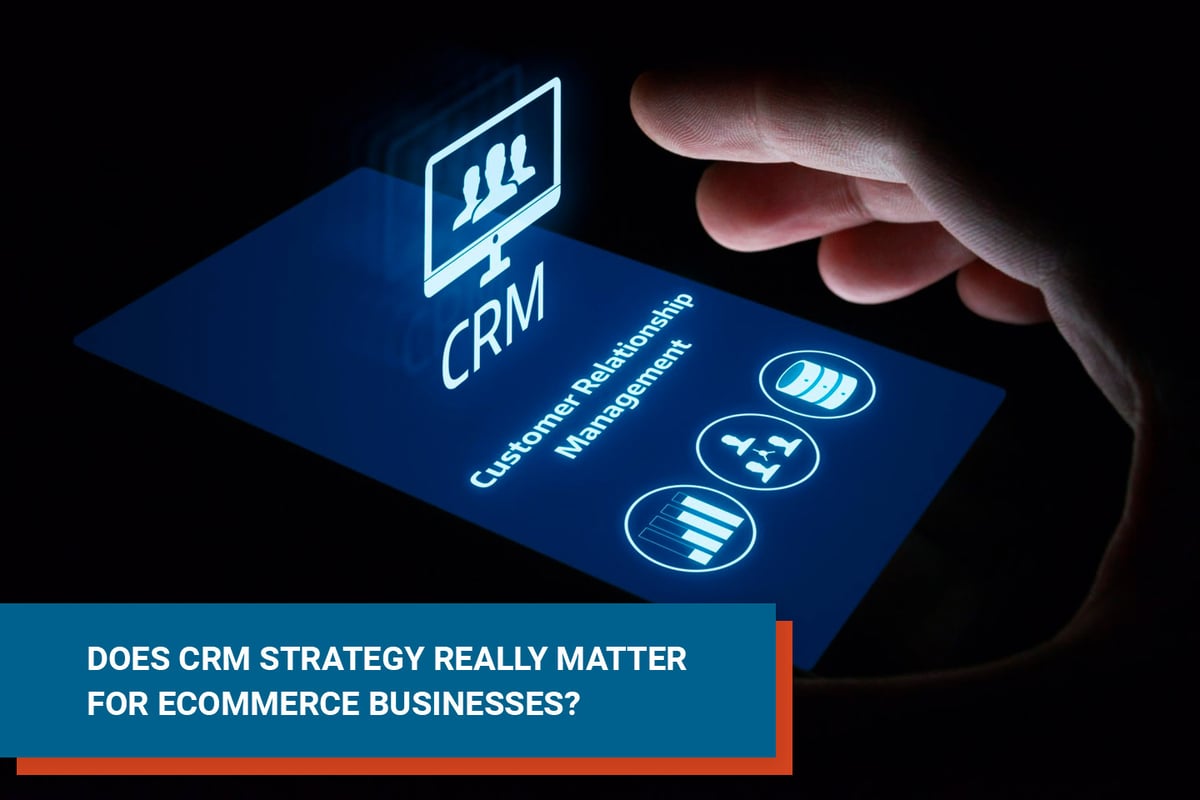Does CRM Strategy Really Matter for eCommerce Businesses?
 Igor Krasnykh
·
4 minute read
Igor Krasnykh
·
4 minute read

Have you ever wondered, “What does CRM stand for?” If so, you’re not alone. The question gets asked more than 8,000 times on Google each month. That’s because CRM is becoming a household term. It stands for Customer Relationship Management, and there are many platforms on the market today that accommodate it.
This Article is For You If:
- You want to understand the full scope of what CRMs offer businesses;
- You’ve heard of the Salesforce CRM but want to better understand its functionality;
- You want to learn more about integrating your eCommerce platform with your CRM;
- You’re interested in connecting with an eCommerce expert for individual guidance.
What Do CRMs Do?
As the name implies, CRMs are designed to improve customer relationships. While a big part of their function is to store customer and prospect data, CRMs are much more than electronic filing systems.
CRMs benefit both businesses and customers. Not only do they help organize and manage contacts, but they also keep a detailed account of every customer interaction. This paves the way for more personalized experiences.
Without CRM, valuable details that stem from even the smallest customer interactions go unrecorded. Because personalization is something customers have come to expect, failing to remember details is a big missed opportunity for eCommerce brands. Instapage reveals 80% of shoppers are more likely to do business with a brand when they give personalized experiences, and 71% say they feel frustrated to some degree when a shopping experience is impersonal.
CRMs also help businesses stay on top of key performance indicators, or KPIs. A few eCommerce KPI examples include the number of unconverted leads in a given month, e-mail click-through rates and the number of on-time deliveries.
Here are three more ways CRMs can work to boost eCommerce ROI.
1. Sales Teams Have The Opportunity to Flourish
CRMs take the burden of administrative duties off sales associates. This gives them more time to focus on getting products and services in the hands of prospects.
Because the latest information is kept in a centralized location, CRMs help keep everyone on the same page. Many CRM systems are cloud-based, which means they can be accessed anywhere on multiple devices. With all associates in the loop on every customer’s journey, employees are able to avoid duplicated efforts and stay on track.
2. Tracking Progress is Simplified
Ecommerce CRM software contains dashboards with analytics information that is easy to digest. The data can reveal trends, as well as the highest- and lowest-producing revenue streams. From there, businesses may adjust their processes accordingly. The data also enables sales forecasting, which is useful for planning budgets and future initiatives.
3. CRMs Enable Businesses to Drill Down on Strategies
Powerful insights from data and customer interactions can be used to create actionable strategies. For example, a CRM may alert businesses when a customer abandons their cart, prompting an email reminding them to complete their purchase.
CRMs can also help drive customer loyalty. The systems are able to assign scores to customers based on brand interactions and may offer suggested actions and next steps according to the data. High-value customers may be rewarded with emails offering special discounts and promotions. When a customer’s life cycle is brief, strategies may be implemented to draw them back in.
What The Numbers Say About CRMs
For business owners that wonder if CRM implementation would have a significant impact on growth or profits, the evidence is clear. According to a data compilation that emerged in 2019, CRMs are becoming a necessity for businesses. Here are a few stats that show how CRMs are taking companies to new heights.
- A survey by Nucleus Research revealed that companies using CRMs report an average of $8.71 return on their technology investment for every dollar spent;
- According to Salesforce, businesses that use CRMs see a 29% sales increase, a 34% sales productivity increase, and a 42% sales forecast accuracy increase;
- Using CRM software can increase sales conversion rates by up to 300%, according to Cloudswave;
- A poll by Capterra found that 47% of CRM users see a substantial impact on customer retention. The same number of respondents said implementing a CRM helped them boost customer satisfaction;
- Sales reps at companies that use CRMs say sales cycles are shortened by 8 to 14% (Source: Nucleus Research);
- Survey data from LinkedIn indicates that 64.2% of companies using a CRM rate the technology as “impactful” or “very impactful” to their ability to increase revenue and grow their businesses.

Salesforce: A Leading Name in CRM Technology
When shopping for the best CRM for eCommerce, Salesforce is worth exploring. More than 150,000 brands trust their CRM needs to Salesforce, including big names like Adidas and T-Mobile. While many different industries rely on Salesforce, the platform boasts several benefits for retail businesses specifically. Here are a few ways Salesforce stands apart as a CRM.
- Salesforce enables businesses to put customers at the core of marketing initiatives rather than products and services. Advanced targeting capabilities allow for personalized marketing communication on a shopper-to-shopper basis.
- Salesforce takes an omnichannel approach to communication. The customer lies at the center of omnichannel communication with physical, email, instant messaging, mobile and social channels surrounding them. The channels cross over when necessary, creating a seamless and integrated shopping experience.
- Salesforce follows a customer’s journey and engages with them on various platforms when the time is right. Customers may receive notifications for discounts, promotions or recommended products based on their browsing and purchase history or a recently abandoned cart.
- Many businesses cite the 360-degree customer profiles in Salesforce as one of the most beneficial features. With this information readily available to associates and support staff, businesses are able to give customers the personalized shopping experiences they crave.
- Another benefit of using Salesforce is its reputation for ongoing innovation. Subscribers can expect helpful upgrades and new features to emerge.
The Importance of Integrating CRM and eCommerce Platforms
In order to be successful, CRMs and eCommerce platforms need to work together. However, there is often no native way for this to happen.
For example, if a business operates its eCommerce store in Magento while using Salesforce as its CRM, duplicated manual data entry will be needed for customer and billing and shipming details. However, the Magento and Salesforce extension by PowerSync provides a solution that updates the information automatically from one platform to the other. When cross-connection between platforms takes place, the process is known as system integration.
Online retail businesses that are not leveraging the power of CRMs are sacrificing the possibility for higher profit margins. When CRMs and eCommerce platforms combine, the potential for growth can be exponentially higher.
Are you ready to explore how a CRM strategy can supercharge your eCommerce business? Schedule time on our calendar for a complimentary consultation.



